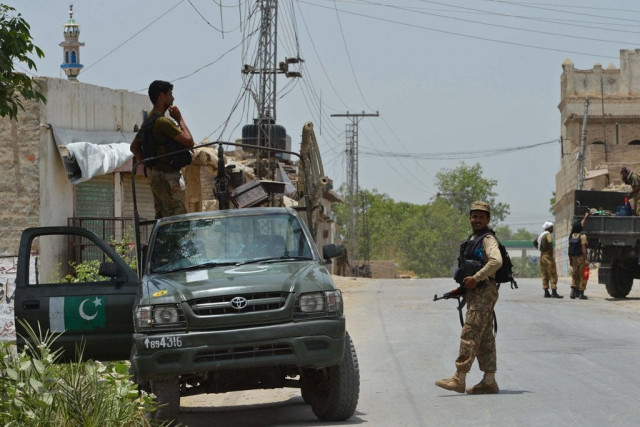And so it begins
Pakistan has entered a battle that will be decisive not only for Pakistan, but for the entire region.

Soldiers heading towards North Waziristan are pictured by a road in Bannu district on June 16, 2014. PHOTO: AFP

We tried the talks. For close to half a year, the government pushed the path of dialogue, hoping against hope that there was a better way out, and continued pushing in the face of widespread criticism. But we were reminded, over and over, again and again, one bloody attack after another, one wailing parent and child after another, that it was not going to be. Ceasefires were broken, our courts, markets and airports targeted, security officials and innocent civilians alike, left dead. And then, after the assault on the country’s largest airport, it seems that a Rubicon was crossed.
There is no doubt that an allout military action was the last option. And in this regard, the government cannot be faulted for exhausting all options to their last. The military must be appreciated for lowering their guns while the government took its time. Today, no one can turn around and say that they didn’t try.
There’s no turning back now, but great caution must still be taken, despite the din of support across the nation for our forces. Let us not forget that North Waziristan is far more thickly populated than the south, which the army took through Operation Rah-e-Nijat (path of riddance) back in 2009. As the bombs are dropped and fire exchanged, great care must be taken in terms of civilian casualties — even though the military has set up paths for the locals to leave and has even set up surrender points for those who want to lay down their arms. The militants will resort to all sorts of tactics, and have nothing to lose, nor will they spare any quarter or scruples; but the military has much to lose in this area. They are the ones that will be facing all the questions from critics who will already be sharpening their knives. There is also a high probability of more attacks on soft targets across the country, especially in the major cities, as the militants hit back, and security must be heightened and all precautions taken in this regard.
Then there are other players involved in this decisive battle other than the people, government and armed forces of Pakistan — players that must also be on board. The reference here is to the forces across the western border in Afghanistan, which, lest we forget, have long complained about Pakistan not doing enough against terrorist sanctuaries. Now the ball is in their court. It is critical that the international forces and the Afghan National Army form a wall to guard the porous border to make sure the militants do not cross — and those who do try to cross are dealt with — the ‘hammer and anvil’ strategy as it is called in the military. Let us not forget the reports of the chief of the Tehreek-e-Taliban Pakistan (TTP) operating out of Kunar province in Afghanistan and crossing over to attack Pakistan hard and often. This cannot be allowed in this case; this is no time for machinations from across the border. In Islamic history, Zarb-e-Azb is said to be the name of the sword the Holy Prophet (pbuh) used in the Battle of Badr — a battle that took place some 1,390 years ago and which changed the course of history as we know it. It is fitting that Pakistan has entered a battle that will be decisive not only for Pakistan, but for the entire region, perhaps even the world — and named it after that very sword.
Published in The Express Tribune, June 17th, 2014.
Like Opinion & Editorial on Facebook, follow @ETOpEd on Twitter to receive all updates on all our daily pieces.















COMMENTS
Comments are moderated and generally will be posted if they are on-topic and not abusive.
For more information, please see our Comments FAQ